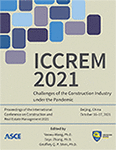Research on the Construction of Teaching System about BIM Series Courses of Engineering Economics and Management Based on Bayesian Network
Publication: ICCREM 2021
ABSTRACT
According to the repositioned training goal of civil engineering talents based on BIM technology, the existing teaching system of engineering economics and management courses should be reformed based on the engineering application value of BIM technology and combined with the current situation of social demand for BIM application talents of civil engineering specialty. According to the observation and statistics of the professional knowledge required by the market, the paper seeks the most likely Bayesian network model and puts forward a teaching system construction method based on Bayesian network. On the basis, the paper could further analyze the individual learning process, evaluate the suitability of relevant individuals according to the results, and put forward teaching suggestions.
Get full access to this article
View all available purchase options and get full access to this chapter.
REFERENCES
Fang, H., Fang, X. W., Guo, J., and Chen, X. K. (2018). “Study on case-driven teaching methods for classification and prediction in course.” Journal of Changchun Teachers College, 37(08), 67–72. (in Chinese).
Feng, Y. H., Wang, T., Sun, B. L., Wang, T. J., and Chen, C. (2019). An introduction to multi-grouped graph Bayesian classification model, National University of Defense Technology Press, Changsha. (in Chinese).
Hawkins, W. J., Heffernan, N. T., and Baker, R. S. J. D. (2014). “Learning Bayesian knowledge tracing parameters with a knowledge heuristic and empirical probabilities.” International Conference on Intelligent Tutoring Systems, Springer, Cham, 150–155.
Huang, C., and Darwiehe, A. (1996). “Inference in belief networks: a procedural guide.” International Journal of Approximate Reasoning, 15(03), 225–263.
Huang, D. X., and Liu, X. X. (2018). “Design and realization of student model based on massive open online courses.” Journal of Computer Applications, 38(A02), 327–330. (in Chinese).
Ju, H. H. (2014). “Integration mode and teaching system innovation of engineering management specialty platform curriculum.” China Education Innovation Herald, (10), 25–27. (in Chinese).
Liu, Y. J., and Li, X. (2019). “Predicting of students’ achievement based on Bayesian network.” Journal of Shandong University of Technology: Natural Science Edition, 33 (05), 75–78. (in Chinese).
Pearl, J. (1988). Probabilistic reasoning in intelligent systems: network of plausible inference, Morgan Kaufmann Publishers, San Francisco.
Pelanek, R. (2017). “Bayesian knowledge tracing, logistic models, and beyond: an overview of learner modeling techniques.” User Modeling and User-Adapted Interaction, 27(03/04/05), 313–350.
Qiao, D. W. (2019). “Research on teaching management reform of credit system in higher vocational colleges based on Bayesian network.” Study on Curriculum Education: Study on Teaching Method, (11), 15–16. (in Chinese).
Shi, J. F., Zheng, F., Shao, B., and Liao, G. J. (2020). “Innovation of the cultivation mode of ability-oriented and application-oriented undergraduate talents.” Research in Higher Education of Engineering, (02), 106–112. (in Chinese).
Tian, L. M., Jia, Y. B., Xu, D. S., and Yin, H. H. (2020). “Exploration on the training model of interdisciplinary applied talents based on BIM.” Journal of Langfang Normal University: Natural Science Edition, 20(04), 100–104. (in Chinese).
Wang, Q. A. (2018). Reliability evaluation method of structural systems based on Bayesian network, China University of Mining and Technology Press, Xuzhou. (in Chinese).
Wei, L. S. (2016). Bayesian statistics, Higher Education Press, Beijing. (in Chinese).
Zhang, N. L., and Poole, D. (1996). “Exploiting causal independence in Bayesian network inference.” Journal of Artificial Intelligent Research, (05), 301–328.
Zhang, Y., and Li, L. (2011). “Construction method of course-content decision based on Bayesian network.” Computer Programming Skills & Maintenance, (14), 144–145. (in Chinese).
Zhong, W., Zhang, X. W., and Jiang, T. T. (2013). “Educational reform in the course of engineering project management based on BIM.” Journal of Information Technology in Civil Engineering and Architecture, 5(06), 7–11. (in Chinese).
Information & Authors
Information
Published In
Copyright
© 2021 American Society of Civil Engineers.
History
Published online: Dec 9, 2021
Authors
Metrics & Citations
Metrics
Citations
Download citation
If you have the appropriate software installed, you can download article citation data to the citation manager of your choice. Simply select your manager software from the list below and click Download.
